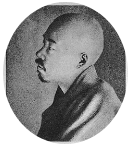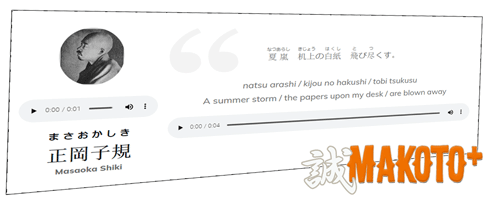Happy Sunday! Today, we will dissect another poem for a stormy summer day. So, grab a cup of coffee (or お茶) and let's dig in!
----
But first, a recap on the week
All free except the newly revised Sound Words in Japanese book!
- FRIDAY: Top 100 Japanese Phrases for Beginners with sound [BEGINNERS]
- THURSDAY: New Makoto+ FREEBIE Sound Words in Japanese newly revised and now with an Anki flashcard deck (Members, see your member area for the download link) Or buy the Japanese Vocabulary Bundle to get the newly revised book.
- THURSDAY: New podcast: Beginning Japanese Phrases Podcast Phrases 94: ~し and [unexhaustive list of items] [BEGINNERS]
- MONDAY: Japanese Idioms using 虫 Mushi – a Bug in One’s Gut [UPPER BEGINNERS+]
- MONDAY: New podcast: Nihongo no Tane 96 オノマトペ2 Onomatopoeia Part 2 | Japanese Immersion Podcast Japanese use sound words and mimetic words far more frequently than in English. Let's continue our onomatopoeia study with Yumi. [INTERMEDIATES]
I hope to have a new module for the idioms course this week, but for now, let's enjoy haiku!
----
And now, today's Sunday Haiku:
Today's haiku is by 正岡 子規【まさおか しき】. Masaoka Shiki (1867-1902) was a Japanese poet and journalist during the Meiji period.
Don't you hate it when you are sitting at your desk writing haiku and a strong wind comes and blows all your papers away? Well, it seems this may have happened to Shiki. At least it served to give him inspiration for a colorful haiku.
Makoto+ Shogun or Lifetime members, click here for today's haiku with sound and almost 100 other haiku lessons. (Not yet a member, let's fix that!)
Haiku lesson
Let's get right to it.
VOCABULARY
- 夏嵐 summer storm [夏 (summer); 嵐 (storm)]
- 机上の on the desk; [机 (desk); 上の~ (on ~; above ~); 上 (above; up) + の is a modifying particle that connects the modifying (机上) and the modified (白紙); 机上 is not a normally used word, but it is used in formal writing or concise poems and such. 机の上の (白紙) would be what is used for “(blank papers) on the desk”]
- 白紙 blank papers [白 (white); 紙 (paper); it could be “white paper” but should be understood as “blank papers”]
- 飛び尽くす are all blown away [飛び (to fly; to jump; to hop); 尽くす (to exhaust; to run out; to run out of; to devote; used as a suffix to mean for “completely” or “to the point of exhaustion”); “masu-stem verb + 尽くす”; the verb combination of 飛び尽す is not so commonly used. A normal way to express this would be 全部飛んだ (all flew away), but the not-so-common wording gives a poetic interest.]
季語【きご】 Season Word
What is the 季語【きご】? It is 夏嵐【なつあらし】 which is either a sudden gust or possibly a typhoon.
Interpretation
Yumi likes Shiki. She says his poems tend to be like mini-movies. They paint a scene one can relive in one's mind. Best of all, this impressive feat is done with only a few words.
One can just imagine the poet at his desk working on his next poem. Perhaps he is struggling for inspiration, but then! Inspiration blows through the window, scattering his pages, and giving him a haiku we are discussing today.
It captures a single moment, but an action-filled moment.
Let's read the poem one more time:
夏嵐 机上の白紙 飛び尽くす
This poem was written in 1896. A year prior, Shiki was a war correspondent for the First Sino-Japanese War 日清戦争【にっしんせんそう】. That experience made his tuberculosis worse and by the time this poem was written, he was in constant pain.
What's your take? Hit reply and let me know.
If you are a Makoto+ Shogun or lifetime member, click here to see this lesson with audio. [Sorry, the Samurai level doesn't have access to past haiku lessons.]
Like this haiku lesson? Did you know we have almost a hundred other haiku lessons on Makoto+ now? All have vocabulary and grammar breakdowns with sound and cultural notes. Shogun and lifetime members have unlimited access to all lessons.
Or take the plunge and become a lifetime member today!
Thank you,
Clay & Yumi










